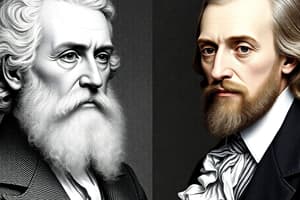Podcast
Questions and Answers
What is the highest level in Maslow's hierarchy of needs?
What is the highest level in Maslow's hierarchy of needs?
- Esteem needs
- Self-actualization (correct)
- Safety needs
- Social needs
What concept is Skinner primarily associated with in his psychological approach?
What concept is Skinner primarily associated with in his psychological approach?
- Cognitive dissonance
- Client-centered therapy
- Maslow's hierarchy of needs
- Operant conditioning (correct)
Which approach did humanistic psychologists reject?
Which approach did humanistic psychologists reject?
- Cognitive psychology
- Qualitative research methods
- Reductionist experimentation (correct)
- Behavioral modification
Which therapeutic technique is associated with Carl Rogers?
Which therapeutic technique is associated with Carl Rogers?
How did Maslow's view on human motivation change with the fulfillment of basic needs?
How did Maslow's view on human motivation change with the fulfillment of basic needs?
What common feature do Maslow and Rogers share in their psychological perspectives?
What common feature do Maslow and Rogers share in their psychological perspectives?
In the context of humanism, what does self-actualization refer to?
In the context of humanism, what does self-actualization refer to?
What type of research did humanistic psychologists largely emphasize?
What type of research did humanistic psychologists largely emphasize?
What is a key focus of behaviorism as established by John B. Watson?
What is a key focus of behaviorism as established by John B. Watson?
How did behaviorists view the subject of study in psychology?
How did behaviorists view the subject of study in psychology?
What role did B.F. Skinner contribute to the field of psychology?
What role did B.F. Skinner contribute to the field of psychology?
Which concept is central to the understanding of Gestalt principles in psychology?
Which concept is central to the understanding of Gestalt principles in psychology?
Which psychological approach became prominent for its objective methods and experimentation?
Which psychological approach became prominent for its objective methods and experimentation?
What assumption did behaviorists make regarding animal models in research?
What assumption did behaviorists make regarding animal models in research?
What is seen as a significant challenge in studying consciousness according to Watson?
What is seen as a significant challenge in studying consciousness according to Watson?
Which factor did Skinner identify as crucial in affecting behavior?
Which factor did Skinner identify as crucial in affecting behavior?
What was Wilhelm Wundt's primary goal in psychology?
What was Wilhelm Wundt's primary goal in psychology?
Which method did Wilhelm Wundt develop for studying conscious experience?
Which method did Wilhelm Wundt develop for studying conscious experience?
What does functionalism focus on in psychology?
What does functionalism focus on in psychology?
Which psychologist is credited with establishing the first psychology laboratory?
Which psychologist is credited with establishing the first psychology laboratory?
What was a significant difference between structuralism and functionalism?
What was a significant difference between structuralism and functionalism?
Which aspect was a common focal point for Sigmund Freud's psychoanalytic theory?
Which aspect was a common focal point for Sigmund Freud's psychoanalytic theory?
Which of the following did William James emphasize in his approach to psychology?
Which of the following did William James emphasize in his approach to psychology?
What is a key characteristic of introspection as used by both Wundt and James?
What is a key characteristic of introspection as used by both Wundt and James?
What are the three key features a therapist should display according to Rogers?
What are the three key features a therapist should display according to Rogers?
What was one of Noam Chomsky's criticisms of the early behaviorist approach in psychology?
What was one of Noam Chomsky's criticisms of the early behaviorist approach in psychology?
Which title did Ulric Neisser publish that contributed to the field of cognitive psychology?
Which title did Ulric Neisser publish that contributed to the field of cognitive psychology?
What term encompasses the interdisciplinary approach involving fields like anthropology and neuroscience?
What term encompasses the interdisciplinary approach involving fields like anthropology and neuroscience?
What impact did the biases of early psychology primarily have on society?
What impact did the biases of early psychology primarily have on society?
How did the cognitive revolution contribute to the understanding of psychology?
How did the cognitive revolution contribute to the understanding of psychology?
What issue did women and ethnic minorities face in the development of psychology?
What issue did women and ethnic minorities face in the development of psychology?
What aspect of the cognitive revolution increased interest in the study of the mind?
What aspect of the cognitive revolution increased interest in the study of the mind?
What is the significance of the unconscious mind in Freud's psychoanalytic theory?
What is the significance of the unconscious mind in Freud's psychoanalytic theory?
Which method did Freud popularize for accessing the unconscious mind?
Which method did Freud popularize for accessing the unconscious mind?
Which of these represents a key idea in Freud's contributions to psychology?
Which of these represents a key idea in Freud's contributions to psychology?
What main premise characterizes Gestalt psychology?
What main premise characterizes Gestalt psychology?
Which of these techniques is often used in modern psychotherapy based on Freud's concepts?
Which of these techniques is often used in modern psychotherapy based on Freud's concepts?
What did Freud's psychoanalytic theory highlight about motivations?
What did Freud's psychoanalytic theory highlight about motivations?
Who were the psychologists credited with the introduction of the Gestalt Principle?
Who were the psychologists credited with the introduction of the Gestalt Principle?
How did Freud describe the relationship between mental representations and behavior?
How did Freud describe the relationship between mental representations and behavior?
Flashcards are hidden until you start studying
Study Notes
History of Psychology
-
Wilhelm Wundt (1832–1920): Considered the "Father of Psychology," he established the first psychology laboratory in 1879 at the University of Leipzig. Wundt's approach, known as structuralism, aimed to understand the structure of the mind by analyzing conscious experience through introspection.
-
William James (1842–1910): First American psychologist who championed functionalism, emphasizing how mental activities help an organism adapt to its environment. He believed introspection, while valuable, should be complemented by objective measures and the study of concrete products of mental activities.
-
Sigmund Freud (1856–1939): An Austrian neurologist who pioneered psychoanalytic theory, focusing on the unconscious mind, early childhood experiences, and their influence on behavior. Freud's theories emphasize the role of the unconscious and the impact of early childhood experiences, and their significance in understanding adult motivations, personality development, and psychotherapy.
-
Max Wertheimer, Kurt Koffka, and Wolfgang Köhler: These German psychologists, credited with introducing the Gestalt Principle, emphasized the importance of perceiving the whole rather than just the individual parts.
-
John B. Watson (1878–1958): A prominent American psychologist who championed behaviorism, focusing on observable behavior and its control. He believed that objective analysis of the mind was impossible and that psychology should focus solely on behavior. He used animals in experiments, assuming that what was learned in animal models could be applied to human behavior.
-
B.F. Skinner (1904–1990): An American psychologist who focused on how behavior was affected by its consequences, emphasizing reinforcement and punishment. His work, while influential, has been somewhat overshadowed by the rise of cognitive psychology.
-
Abraham Maslow (1908–1970): An American psychologist known for his hierarchy of human needs, which posits that basic needs must be met before higher-level needs can motivate behavior. He believed in the potential for self-actualization, where individuals achieve their full potential. His emphasis on the positive aspects of human nature is a cornerstone of humanistic psychology.
-
Carl Rogers (1902–1987): Another prominent humanistic psychologist who emphasized the potential for good in all people. His client-centered therapy focuses on the patient taking the lead in the therapeutic process, with the therapist providing unconditional positive regard, genuineness, and empathy.
-
The Cognitive Revolution: A shift in the 1950s that saw a renewed interest in the mind as a subject of scientific inquiry. This was fueled by developments in linguistics, neuroscience, and computer science. Noam Chomsky (1928–) was a key figure, arguing for the reintegration of mental functioning into psychology. The cognitive revolution emphasized interdisciplinary approaches, collaborating with scientists in anthropology, linguistics, computer science, and neuroscience.
-
Feminist Psychology: A movement addressing the biases inherent in the history of psychology, which was dominated by Western, white, and male perspectives. This movement emphasizes the need for a more inclusive and diverse understanding of psychology to account for the experiences of women, ethnic minorities, and people of different sexual orientations.
Studying That Suits You
Use AI to generate personalized quizzes and flashcards to suit your learning preferences.




